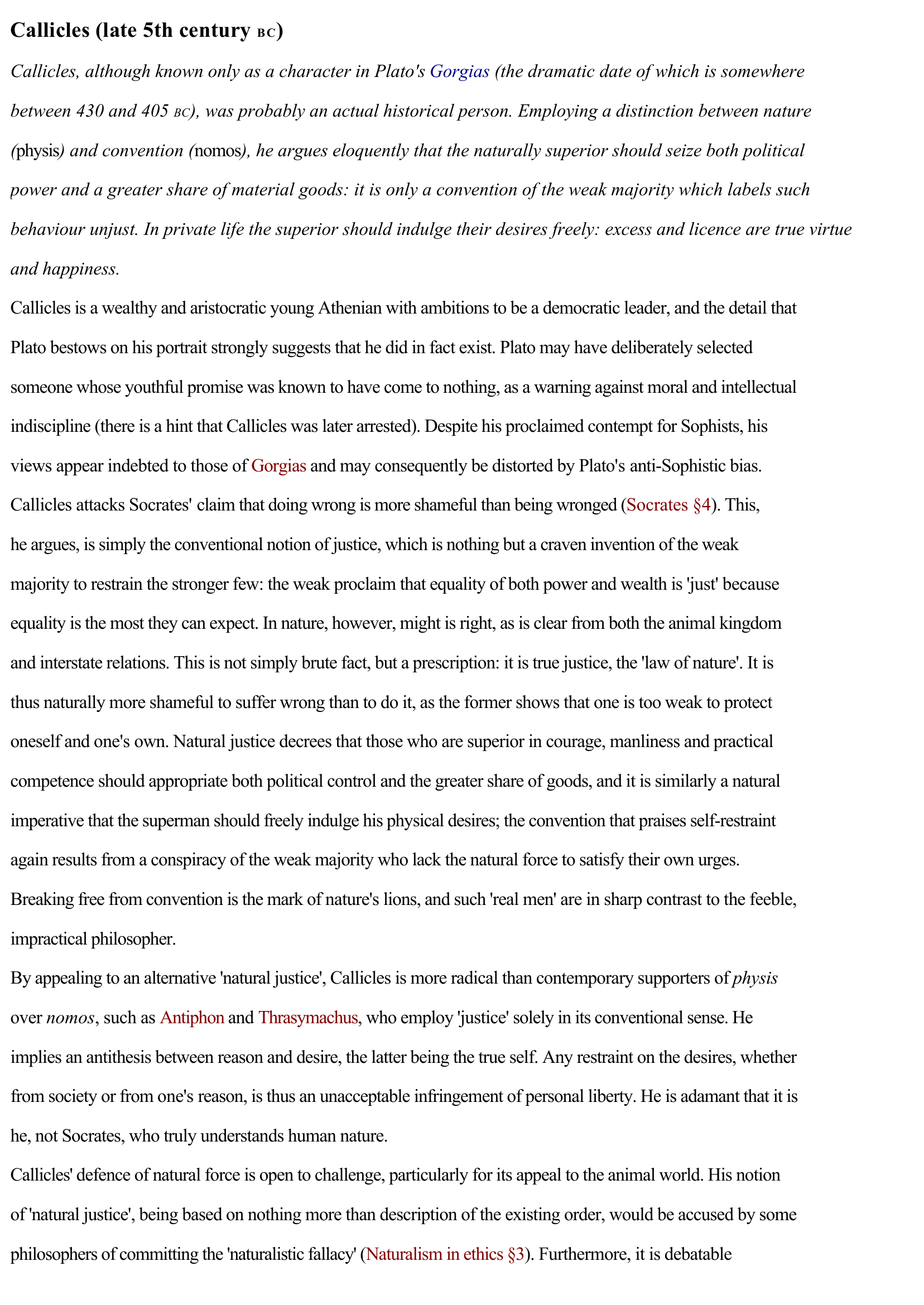Callicles
Publié le 16/05/2020

Extrait du document
«
Callicles (late 5th century BC)
Callicles, although known only as a character in Plato 's Gorgias (the dramatic date of which is somewhere
between 430 and 405 BC), was probably an actual historical person.
Employing a distinction between nature
(physis ) and convention ( nomos ), he argues eloquently that the naturally superior should seize both political
power and a greater share of material goods: it is only a convention of the weak majority which labels such
behaviour unjust.
In private life the superior should indulge their desires freely: excess and licence are true virtue
and happiness.
Callicles is a wealthy and aristocratic young Athenian with ambitions to be a democratic leader, and the detail that
Plato bestows on his portrait strongly suggests that he did in fact exist.
Plato may have deliberately selected
someone whose youthful promise was known to have come to nothing, as a warning against moral and intellectual
indiscipline (there is a hint that Callicles was later arrested).
Despite his proclaimed contempt for Sophists, his
views appear indebted to those of Gorgias and may consequently be distorted by Plato 's anti-Sophistic bias.
Callicles attacks Socrates ' claim that doing wrong is more shameful than being wronged ( Socrates §4 ).
This,
he argues, is simply the conventional notion of justice, which is nothing but a craven invention of the weak
majority to restrain the stronger few: the weak proclaim that equality of both power and wealth is 'just' because
equality is the most they can expect.
In nature, however, might is right, as is clear from both the animal kingdom
and interstate relations.
This is not simply brute fact, but a prescription: it is true justice, the 'law of nature' .
It is
thus naturally more shameful to suffer wrong than to do it, as the former shows that one is too weak to protect
oneself and one's own.
Natural justice decrees that those who are superior in courage, manliness and practical
competence should appropriate both political control and the greater share of goods, and it is similarly a natural
imperative that the superman should freely indulge his physical desires; the convention that praises self-restraint
again results from a conspiracy of the weak majority who lack the natural force to satisfy their own urges.
Breaking free from convention is the mark of nature's lions, and such 'real men' are in sharp contrast to the feeble,
impractical philosopher.
By appealing to an alternative 'natural justice' , Callicles is more radical than contemporary supporters of physis
over nomos , such as Antiphon and Thrasymachus , who employ 'justice' solely in its conventional sense.
He
implies an antithesis between reason and desire, the latter being the true self.
Any restraint on the desires, whether
from society or from one's reason, is thus an unacceptable infringement of personal liberty.
He is adamant that it is
he, not Socrates, who truly understands human nature.
Callicles' defence of natural force is open to challenge, particularly for its appeal to the animal world.
His notion
of 'natural justice' , being based on nothing more than description of the existing order, would be accused by some
philosophers of committing the 'naturalistic fallacy' (Naturalism in ethics §3 ).
Furthermore, it is debatable.
»
↓↓↓ APERÇU DU DOCUMENT ↓↓↓


